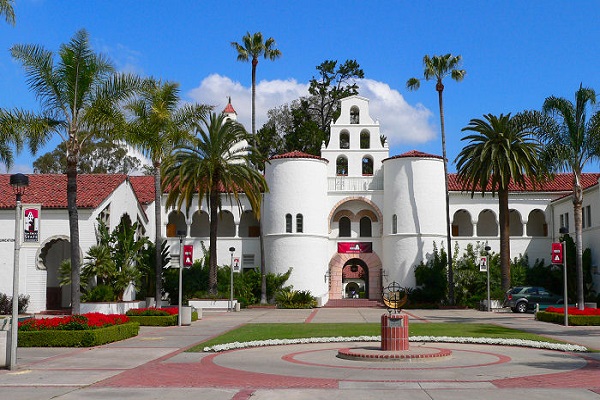San Diego State University Prof. Emeritus Makes Gift to Start SDSU Space Club
The United States first landed astronauts on the moon in 1969. Since then, there have been five additional landings to explore and understand Earth’s nearest neighbor.
Over 50 years later and with the next generation of aspiring space explorers at San Diego State University ready to take off, what will 2023 and beyond hold?
It’s no secret the aerospace industry is booming. From private companies funding satellites, possible moon landings, and more, the U.S. once again is becoming active in space exploration initiatives. Professor emeritus Mauro Pierucci has taken note.
Pierucci taught aerospace engineering in the College of Engineering from 1979 to 2011, inspiring students to study and dream big to explore the great unknown: outer space.
Pierucci has made a gift to the college to start SDSU’s Outer Space Club in hopes that its resources will enable students to think big and gain the skills needed to become successful in the aerospace industry.
“I want to see ideas and problems that our society will need and use in the next 20-50 years,” said Pierucci.
Back in the Day
When Pierucci was in high school and college, the space race was in full mode after Soviet satellites “beat us to the punch,” he said.
The success of those flights made Pierucci dream about the future and led him to pursue aerospace engineering as a career.
“I dreamt of astronauts going to the moon and beyond, but unfortunately, the progress ended with the last moon landing over 50 years ago,” he reflected.
Having personally taught and mentored SDSU students, Pierucci strongly believes the ideas that we will use in space in the next decades and beyond will come from SDSU talent if they have the right resources.
A New Launch
In providing a starting gift for the Space Club, “I firmly believe that in the near future our society will be able to access space in general in a more aggressive manner and I think that this is an area of very positive future for our next generation of engineers,” said Pierucci. “I want to excite the next generation of engineers to think far into the future and I hope that the space club will do that.”
Justin Lynch, a fourth-year aerospace engineering student with a minor in computer science, is part of that next generation.
As president of the new club, he hopes to connect and involve student peers with a way to collaborate in ongoing space-oriented research projects.
“Recently, there has been an increase in the desire for space exploration and space-oriented missions,” said Lynch. “I think it is super important to expose undergraduate students to this industry, thus bringing about the next generation of space industry engineers.”
With “The future begins with you” as its motto, the Space Club aims to be noticed by companies in the space industry through local news. They also hope to be looked at as a way for students to get involved in an extracurricular project that they can take pride in.
Future Directions
As the Space Club begins recruiting members who want to discuss space mission ideas, gain hands-on experience in the next generation of space developments, and find community on campus, the club is “training one astronaut at a time.”
Lynch’s own post-graduate goal is “to work on human space exploration missions, and if I’m lucky enough to be able to, go to space myself.”
Through his donation, Pierucci hopes to see his dream become reality at the institution where he spent over three decades of his career.
“I hope the support that I am providing the Space Club will entice other emeriti faculty to contribute to areas that they would like to see in the future.”

